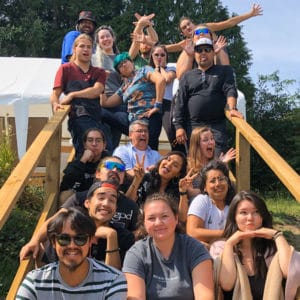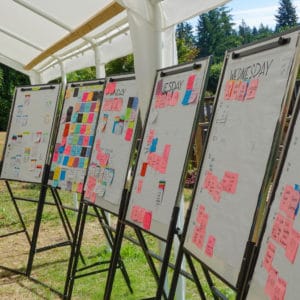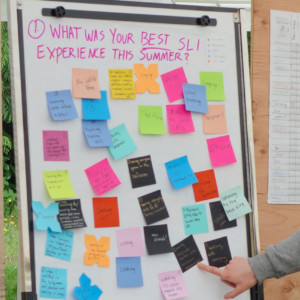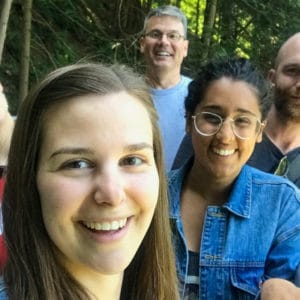Sky Hopinka wraps up the summer trip to China and discusses topics that have come up regarding WAYK, language revitalization, and decolonization. Sky also wants to say that he is not speaking on behalf of Where Are Your Keys? These are just some of his thoughts about some stuff.
Part One of Two…or Three.
So it’s been quite a while since I last wrote a blog. I’ll try to be quick. I have returned from China. Months ago, in fact. The rest of the trip went well enough. We continued working on the POW curriculum after returning from Dalan; David stayed in Beijing for another three weeks after that, where we wandered, loitered, navigated the internet and filmed some stuff for the project. We also made it to the Peking Opera, which was rad.
After David left, I stayed in Beijing for another three weeks. I got a job being a private tutor, and I got to teach one on one using WAYK five days a week, twice a day; an hour an a half each go. It was scary, we blew through the USC we worked out for POW within the first three days, after that it was a lot of mad science and really realizing how interesting English is as a language. I’m still working on getting everything down on paper, but basically it came down to setting up the prepositions and function words and all the weird times that you’re supposed to say one thing and not the other. It was fun. We also started doing TQ: The Walk during the last week of the sessions. Since the heat was atrocious, we did a short, quick walk in the student’s living room. It was semi spacious, but a really nice set up with a long couch, a short couch, four chairs around the table, seven chairs total in the house, a tall lamp and a short lamp, and a nice little route around the room. We got a lot of mileage out of it and would repeat the walk three times each session, reviewing and adding on more and more language as the student learned.
Also, here is the POW video that I made about the partnership between WAYK, BEAM, and the project this past summer:
Since getting back to the States, I’ve been fortunate enough to travel with Evan to many different communities and help out however I can. It’s really encouraging to see so many people passionate about their languages and doing whatever it takes to ensure its survival. Yet there are a lot of things that keep coming up; namely politics, identity, race, and colonization. Yes, those are pretty weighty and heavy, and substantial topics and issues. But I think that the more that we talk about them and work through them, the sooner action is bound to happen. To be completely honest, there have been many times while I’ve been working with indigenous languages that I just want to quit. And I haven’t even been doing this for that long. But I didn’t, and still haven’t.
I’d rather not go into the political part of this, as it is a little too personal. But I do want to note that by “political” I am referring to both the governmental, sovereignty based issues and the more individual “politicking” aspects of language revitalization. It’s a pain in the ass, but it’s there and something that needs to be worked through, for everyone involved. Teamwork. Yeah. We’ve been working on Techniques (TQ) for this. Not yet contracted, though.
The big concepts that seem to cover all of those issues are:
Colonization. Decolonization. <=Those guys.
I became aware of decolonization as an academic term five or six years ago, and mainly through terms of decolonizing pedagogical methodologies. (There is a collection of essays called Decolonizing Methodologies that I recommend, among many others.) In the past few years I’ve really noticed a surge of voices who are taking this idea to the next level. It’s great. Right on. However, in terms of WAYK, it’s recently become a topic of conversation as far as how can we improve the system to accommodate decolonization efforts. The discussion involves really making clear what these Techniques can do, and in the next post I’ll share more ideas that I have about decolonization.
But first,
I’ll start with the USC. The good ol’ Universal Speed Curriculum. Old reliable. One thing that needs to be clarified is that the road map that is the USC, is only a suggestion, a conversation starter. It’s the linguistic equivalent of small talk at a cocktail party: boring and not something that your language particularly wants to be wooed by. I’ve never been to a cocktail party, but I can imagine. I can say with almost a lot of certainty that no language will follow the English USC exactly. And that’s a beautiful thing. Take the USC, look at it once, put it away, and hunt those fuzzy concepts that the USC represents, not the words. If there are concepts in the USC that don’t exist in your language, then it’s perfectly fine to change the USC. That’s when it stops being the universal speed curriculum and starts becoming the Your-Language-Here Speed Curriculum. Concepts such as want/have/give/take, mine/yours, etc, that are part of the foundation of the USC are still just concepts. If politeness, norms, or mores occur in your culture that are opposite that of what is in the USC, by all rights, make adjustments to the USC and change it, adapt it, and run with it.
Another issue is intonation. It is very tempting to impose English intonation when asking and answering questions in the target language, and honestly it’s a hard habit to break, but it’s part of the process, and it can always be fixed with TQ: Accent and explained by TQ: Mumble. So as you hunt, keep an ear out for intonation, run through the conversation with the fluent speaker and try and copycat along as best you can. But I suggest not letting it be main focus of your first hunt, or second, or third. You’ve got to TQ: Limit somewhere, and best to get some language under your belt. A more advanced hunting TQ is purposefully testing a question with an English inflection to prompt the speaker to 1) confirm or correct what was being hunted and 2) to correct you improper inflection. It’s easy to get everyone confused by doing this, so be careful.
Really, when you start packaging rides and teaching them off is when you want to go over intonation and make any accent adjustments. Even if the realization of proper intonation comes when you’re halfway fluent it’s still okay to make that adjustment, and go back and download your brand new accent to everyone you taught. It’s okay to unlearn.
Intonation and the malleability of the USC are a few issues that come up when discussing language revitalization and the process of active revitalization. It’s a rational fear that occurs when we start objectively examining the language(s) that we’re trying to save, and are taking into account the obstacles that we face and how the influence that English and the dominant culture we live in affect that process.
Still, remember, that there are some conversations that you need to have about your language that you can only have in your language. I’m of the Davidedwardsian school of thought that nothing translates. Ever! So get fluent. It’ll be fun. Then take Grandma to that coffee shop in Spain we’re always talking about.






Sky, I’m guessing you were the one behind the camera all the time. That was a very impressive video. It’s exactly what I need to help sell WAYK to all the English teachers I know around the world and any teacher in the U.S. Let us know when you’ve got your ESL curriculum ready for distribution.
The problem is that you will never be able to sell the idea to anyone as long as it’s licensed under an “CC-NC” license — as a teacher, I need to be able to make a living, and following a syllabus that I’m legally permitted to use if and only if I run the classes for free is simply impossible.
Sorry. By “sell WAYK” I meant “sell the idea of WAYK”. The methods and teaching style are free to use. They would of course probably sell the curriculum they have created for a price. My problem has been explaining to people what WAYK is and how effective it is.
When are you coming to Hong Kong? I need some assistance here!! 🙂